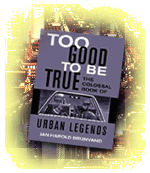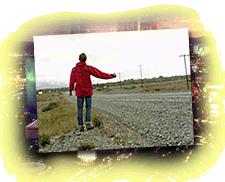
One of the great things about travel is the stories you bring home...the
drug-sniffing dog that knocked you over in customs...or the memory of some
person that became your best friend for a day on the road. Chances are,
though, it won't be long before the conversation turns from stories of
first-hand experiences...to stories that happened to a friend of a friend,
or that you heard on the news, or got via email. Stories that may seem a
bit suspicious. Hal Cannon of The Open Road recently visited his old
folklore professor to find out about these "urban legends of travel."
The Open Road: Urban Travel Legends
by Hal Cannon
Back in the 60's I took my first folklore class. The professor started
out the first day asking if we'd heard any vanishing hitchhiker stories --
you know, the ones where the guy picks up a hitchhiker who mysteriously
disappears from the car, leaving her sweater behind. When the guy returns
it to her parents he learns she was killed exactly one year before on the
very spot where he picked her up. Not only had other students heard
variations on the story but he played songs about that fated anniversary.
I grew up with a family version of the vanishing hitchhiker and, frankly,
felt a little violated when I found out our venerable story was a resident
of the land of folklore. Professor Jan Brunvand.
Brunvand: "I like to say they're true stories...that are too good to be
true. They're told as an experience of a friend-of-a-friend, but they're
too bizarre to be true. And...the same stories are told in lots of
different places.

Jan Brunvand's been collecting these legends for 30 years and just came out
with a new book, Too Good to Be True: the Colossal Book of Urban Legends. He's got filing
cabinets bursting with 'em, stories about family life, sex, business,
pets, politics and, of course, travel.
Jan and I have come to the Travel Zone Agency in Salt Lake City. I figure
if any one group is expected to know every tourist story in the book, it
has to be travel agents.
Jensen: "They truly think that when they dial our number, we know every
corner of the planet."
Brent Jensen's been a travel agent for 16 years and has heard some doozies.
Jensen: "I've had clients tell me that their cousin whom I know had been to
Vegas and had woken up in the tub with ice around them, with a note that
said 'Don't move, because we've harvested your kidney.' That apparently
it's these prostitutes apparently lure them in this room, sedate them,
harvest their kidney and put them in the tub. The interesting thing is when
I heard it for the first time, I though, 'Oh my God..what's the deal with
this?' But the person it supposedly happened to, I ran into and said, 'How
are you doing? What a horrific thing!' [laughs] and they looked at me like
I just fell off the edge of the planet."
Brunvand: "It's a well-known urban legend. I call it the kidney
heist...been around for years."
It doesn't take long before the stories start gushing forth.

Montage: "You always hear the story about the couple who bring their film
back from a vacation and someone had snuck in their room." "The couple in
Hong Kong at a restaurant and the waiter speaks only Chinese." "She gets
into her cabin, looks at her roommate and says, 'I hear birds.'" "That's
gonna turn into the emergency door flew off the plane and ended up in
Phoenix." [Laughter]
These stories can easily spread out of control. Brunvand says they start by
word of mouth but often they go public.
Brunvand: "A lot of times a rumor may go through the community. The
newspapers and broadcast media will be tipped off about it. They'll look
into it and may debunk it or just repeat it as a kind of lively item in an
otherwise serious news story. It doesn't seem to matter to people if it's
valid. If it gets into print, some people are just gonna repeat the story."
Over and over and over again. These legends don't respect international
borders. Time and time again, the same story might resurface over a 100
years. Nowadays, with e-mail, some of these urban legends spread like
viruses. One expert calls them 'thought contagion.' Some even enter pop
culture, like the one about the family going on a car trip with an elderly
relative who, along the way, suddenly becomes ill.
Clark: "She's fine. Don't be silly."
Ellen: "She's not fine, Clark. She's dead." [Car skids]
Remember National Lampoon's Vacation?
Clark: "She can't weigh more than 100 pounds."
Ellen: "Oh no! You can't put her up on that roof!"

Clark: "What do ya want me to strap her to the hood? She'll be fine. It's
not as if it's gonna rain or something. [Thunderclap and rain]
Hal: "What purpose do you think urban legends serve?"
Brunvand: "Part of it is just entertainment. People like to hear and retell
the latest story. And what's nice about the urban legends is that you don't
have to be an expert storyteller. It's not like a joke where you have to
tell the punchline just right. You have to master a dialect, and get the
timing right. But also underlying there are certain messages. There are real
dangers out there. You should do things like watch your kids in the
shopping mall cuz there are these abduction things. Check the back seat of
your car because I've heard of this killing in the back seat story. Watch
out about food contamination, cuz you've heard about the mouse in the Coke,
the Kentucky Fried rat..."
Hal: "Let's get to travel a minute. In the old days when travel really was
dangerous, it held more mystery to it. We're much more mobile. Do we need
urban legends of travel any more?"
Brunvand: "So you think travel is safe now? Uh-huh. You haven't heard about
the commercial airline flight in which the pilot stepped out. And the
copilot, after a decent interval, he needed to go to the restroom. They
were at their cruising altitude. He decided he could set the automatic
pilot and go back to the restroom. And he did, closing the cabin door
behind him. And when he came out, he came out to the pilot and need the key
to the cockpit. And the captain says it's in my coat pocket on the seat.
And of course they both stopped dead in their tracks and realized the door
was locked and they took down the fire axe and broke the door down."
From The Open Road, I'm Hal Cannon for The Savvy Traveler.
Savvy Resources for Urban Travel Legends:
- Urban Legends Reference Pages
http://www.snopes.com
Including information on urban legends, but also misinformation, old wives'
tales, strange news stories, rumors, and celebrity gossip.
- The Urban Legends Archive
http://www.urbanlegends.com/
Archive of urban legends including, but not limited to, stories collected
from alt.folklore.urban.
- The Urban Legends Research Centre
http://www.ulrc.com.au/
Dedicated to the ongoing investigation and research of Urban Legends, Urban
Beliefs and folklore.
|
|







